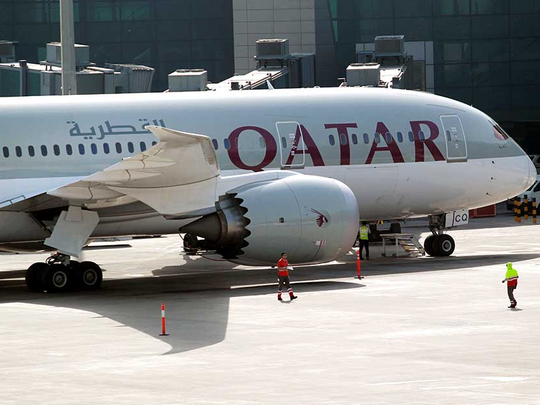
London: Airbus turned up the heat in a dispute with one of its biggest customers, accusing Qatar Airways of instigating a local grounding of A350 jetliners in order to claim compensation over alleged surface defects, and terminating a separate order for its hard-to-get A321neos.
“There is no reasonable or rational basis” for Qatari regulators to have grounded 21 of the A350s operated by the state-owned carrier, according to documents prepared by Airbus for a London court hearing on Thursday. The plane-maker will contend that Qatar Airways “sought to engineer or has acquiesced” in the groundings because it’s in the airline’s economic interest to idle planes “given the impact of the coronavirus pandemic” on demand.
The high-stakes battle is getting underway in London after Qatar Airways sued Airbus over defects with the surface paint of the twin-aisle jet. The plane-maker said Thursday that it rescinded a separate contract to deliver smaller A321s, putting pressure on the Gulf airline as Qatar gears up to host the World Cup soccer event later this year.
Duelling regulators
While European regulators have found the surface flaws with the A350 don’t pose any airworthiness issues, regulators in Qatar have been grounding affected A350s since the middle of last year. The carrier, which brought back A380 superjumbos to replace the lost capacity, is seeking more than $700 million in compensation for being unable to use the A350s - $618 million through December 17 and a further $4.2 million per day.
No compensation is payable, Airbus said in the filing. Qatar Airways is “in clear default of its contractual obligations” in refusing to accept two A350s for delivery. Airbus now says it won’t deliver one of the A350s. It has delivered 53 A350s to the carrier out of 76 commissioned.
Order terminated
The France-based manufacturer said it terminated a separate contract to deliver A321neo aircraft to Qatar Airways, according to the filing. Handover slots for the popular single-aisle model are prized, with no new availability through 2023. Qatar said in its own documents made public on Thursday that the A321neos were not part of the dispute until January 17.
It said Airbus isn’t entitled to rely on cross default as the basis to cancel the contract. The airline has 50 of these aircraft due for delivery between February 2023 and April 2031, with six due to be delivered in 2023, it said.
The row over peeling and cracked paint on the A350s rumbled on for months before entering the legal realm when Qatar Airways decided to sue Airbus late last year. Airbus has acknowledged that airlines including Finnair Oyj have seen similar paint issues, but no other carrier has grounded planes and the manufacturer disputes Qatar’s characterization of the problem as a safety concern.
Local regulators typically follow the lead of the certifying authority, in this case the European Union Aviation Safety Agency, although in certain instances, like the grounding of Boeing Co.’s 737 Max in 2019, local officials will act on their own. Airbus claims that in this case, after it agreed to pay Qatar Airways $175,000 a day for unscheduled groundings tied to fixing surface issues on a single A350, the airline sought more inspections by the Qatar Civil Aviation Authority.
Qatari regulators eventually grounded 21 planes, despite a parallel EASA probe which found no flight-safety risk to question the A350’s airworthiness. Airbus maintains it has provided a full root-cause analysis of the problem, which Qatar disputes.
State ties
The plane-maker said these decisions were carried out “apparently at the instigation” of Qatar Airways, but didn’t offer specifics. Demand for air travel has been depressed for two years because of the pandemic, especially on the long-distance routes that intersect at Gulf hubs like Doha.
For its part, Qatar Airways is seeking resolution of the dispute in time to use grounded A350 aircraft at the center of the row for the soccer World Cup later this year. The inability to use the long-haul jets for the event, which starts in Qatar on November 12, would deprive the carrier of vital passenger capacity, Akil Shah, a lawyer for Qatar Airways, said in court on Thursday.
“This is the year of the World Cup so capacity to travel to Qatar is going to be at a premium,” he said at the hearing. “The lack of the 21 aircraft is going to have very serious practical consequences.”










